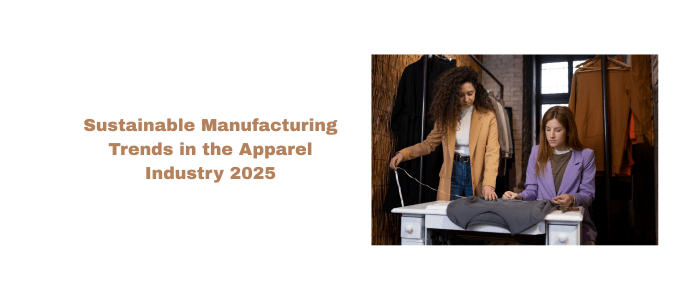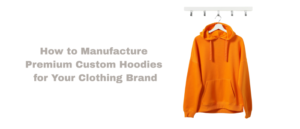The fashion industry is entering a new era — one defined by responsibility, innovation, and conscious production. According to recent data, the global sustainable fashion market is valued at over USD 12.46 billion in 2026, with the U.S. market leading the way in responsible apparel manufacturing. As consumers demand more transparency and eco-conscious products, sustainable manufacturing trends are reshaping how apparel is designed, sourced, and produced. In 2026, sustainable apparel manufacturing is not just an ethical choice but a business necessity.
From fabric innovations to circular design systems, brands across the United States are rethinking their production processes to reduce waste and environmental impact. Companies like Argus Apparel are leading this transformation, integrating advanced technologies and sustainable practices into every stage of clothing production.
What Is Sustainable Manufacturing in Apparel?
Sustainable clothing production refers to the process of creating apparel while minimizing harm to the environment and promoting ethical working conditions. It involves every step — from sourcing raw materials and manufacturing to packaging and distribution. All these approaches aim to reduce waste and carbon emissions.
Ethical clothing manufacturing ensures fair wages, safe workplaces, and respect for workers’ rights, while eco-friendly production focuses on reducing resource consumption, water usage, and harmful chemicals. Circular fashion manufacturing, on the other hand, reimagines how garments are designed, encouraging recycling, repair, and reuse to extend product lifespans. The apparel industry accounts for 10% of global carbon emissions, making sustainability a top priority.
For modern apparel brands, sustainability is no longer a niche, it’s an essential framework! It shapes how products are made and valued.
Also read: Clothing Distributors vs. Wholesale Clothing Manufacturers: What’s Best for Your Fashion Brand?
Top Sustainable Manufacturing Trends to Watch in 2026
In 2026, sustainability became the foundation of apparel manufacturing, shaping how brands design, produce, and deliver their products. The global apparel industry is projected to reduce its carbon emissions by over 30% by 2030, due to the widespread adoption of innovative, sustainable manufacturing methods. These practices not only align with global climate goals but also strengthen brand loyalty among environmentally conscious consumers.
Brands adopting circular and low-impact production models are already reducing waste by up to 40% annually, while also improving profitability through resource efficiency and consumer trust. This shift demonstrates that sustainability is not just an environmental goal, it’s a competitive advantage reshaping the global apparel market.
Bonus Trend: AI and Data-Driven Production Planning
A growing number of manufacturers are leveraging AI and predictive analytics to optimize resource allocation, reduce fabric waste, and forecast consumer demand with greater accuracy. This intelligent approach enables apparel brands to align production with market needs, lowering overstock and supporting a more sustainable, cost-efficient supply chain.
1. Circular Fashion & Closed-Loop Production
Circular fashion is transforming the apparel lifecycle by eliminating the traditional “take, make, dispose” model. Instead, closed-loop production systems enable materials to be reused, recycled, or regenerated into new garments.
Brands are implementing recycling programs that convert textile waste, offcuts, and post-consumer garments into new fibers. This model helps reduce landfill waste and significantly lowers the industry’s overall carbon footprint.
According to the Ellen MacArthur Foundation, circular fashion could unlock $560 billion in economic opportunities globally while cutting waste and emissions dramatically.
Argus Apparel, as a private label manufacturer, integrates closed-loop practices through eco-certified fabrics and advanced waste-reduction technologies, empowering brands to produce apparel that supports long-term sustainability goals without compromising quality.
2. Use of Recycled & Regenerative Fabrics
The rise of green apparel manufacturing has brought a sharp increase in the use of recycled and regenerative fabrics. Instead of relying on virgin fibers, brands are adopting sustainable materials such as recycled polyester, organic cotton, hemp, bamboo, and Tencel.
Regenerative farming, which rebuilds soil health and restores biodiversity, is gaining attention for its environmental benefits. This approach enhances carbon capture and supports local farming communities.
At Argus Apparel, the sourcing process emphasizes high-quality, eco-friendly textiles that are both durable and ethically produced. The company’s partnerships with sustainable suppliers ensure compliance with global eco-certifications, helping clients meet their environmental targets while maintaining product excellence.
3. Waterless & Low-Impact Dyeing Technologies
Conventional textile dyeing is responsible for 20% of global wastewater pollution, making it one of the most environmentally harmful processes in fashion. The shift to low-impact dyeing and waterless dyeing technologies in 2026 is transforming how fabrics are colored.
Techniques such as CO₂ dyeing, digital printing, and enzyme-based dyeing drastically reduce water consumption and eliminate toxic discharge. These methods create vibrant colors while minimizing environmental harm.
Private label manufacturers like Argus Apparel have adopted water-efficient dyeing systems and safer chemical alternatives, producing visually appealing garments that align with the principles of eco-friendly manufacturing practices.
4. Digital Sampling & On-Demand Manufacturing
The digital transformation of apparel production is reducing waste and increasing speed to market. Digital sampling enables designers to create realistic 3D garment prototypes before physical samples are made, significantly lowering material waste and production costs.
Meanwhile, on-demand manufacturing allows brands to produce garments based on real-time demand rather than bulk production. This model reduces overstock, limits unsold inventory, and ensures resources are used efficiently.
Argus Apparel leverages digital design tools and flexible production models to help brands achieve precision, efficiency, and sustainability — from concept to final product.
5. Transparency Through Supply Chain Traceability
Modern consumers demand accountability and openness from the brands they support. Supply chain traceability ensures full visibility at every stage of production — from fabric sourcing to garment delivery.
Through innovations like blockchain tracking, digital product passports, and AI-based monitoring, brands can verify that their products meet environmental and ethical standards.
Argus Apparel integrates traceability solutions that provide brands with complete insight into their supply chains, reinforcing a commitment to transparency, compliance, and ethical production.
Summary of Key Sustainable Manufacturing Trends in 2026
| Trend | Key Focus | Environmental Impact | How Argus Apparel Leads |
|---|---|---|---|
| Circular Fashion & Closed-Loop Production | Recycling and reusing materials | Reduces landfill waste and carbon footprint | Uses eco-certified fabrics and waste-minimizing systems |
| Recycled & Regenerative Fabrics | Sustainable and renewable textiles | Cuts emissions and promotes biodiversity | Prioritizes organic, recycled, and regenerative materials |
| Waterless & Low-Impact Dyeing | Efficient and chemical-free coloring methods | Reduces water use and pollution | Adopts CO₂ dyeing and safe color technologies |
| Digital Sampling & On-Demand Manufacturing | Virtual prototyping and smart production | Minimizes overproduction and fabric waste | Implements 3D design and on-demand production systems |
| Supply Chain Traceability | End-to-end production transparency | Ensures ethical sourcing and accountability | Integrate traceable sourcing and digital monitoring |
How Argus Apparel Implements Sustainable Manufacturing
At Argus Apparel, sustainability is not an afterthought — it is the foundation of every production decision. The company’s approach to sustainable apparel manufacturing reflects a balance between innovation, ethics, and environmental responsibility. By integrating advanced technologies, responsible sourcing, and transparent operations, Argus Apparel helps brands build apparel lines that are both profitable and planet friendly.
Sustainability at Argus Apparel is viewed as a continuous journey — one that evolves with new technologies, changing consumer expectations, and global environmental priorities. Here’s how the company puts its sustainability vision into action:
Eco-Friendly Manufacturing Practices
Argus Apparel has redesigned its production model to minimize waste and conserve energy. Its eco-friendly manufacturing practices include using energy-efficient equipment, solar-assisted production facilities, and automated systems that optimize fabric cutting to reduce material waste.
The company employs low-impact dyeing and water-saving finishing processes to significantly lower water usage and chemical discharge. These practices not only protect natural resources but also ensure a cleaner, safer working environment.
Additionally, the manufacturing units follow strict environmental compliance standards to maintain transparency and accountability across all operations.
Sustainable and Certified Materials
Raw material selection is a key element of sustainable apparel manufacturing. Argus Apparel prioritizes GOTS-certified organic cotton, recycled polyester, hemp, and biodegradable fabrics that meet international environmental and ethical standards.
By collaborating closely with trusted suppliers, the company ensures every fabric meets rigorous sustainability benchmarks — from cultivation and processing to finishing and packaging.
This material strategy helps reduce the dependency on virgin resources, lowers carbon emissions, and provides clients with durable, high-quality fabrics that align with eco-conscious brand values.
Digital Production and Smart Design Systems
Innovation drives sustainability at Argus Apparel. The company leverages 3D design software, digital sampling, and on-demand production models to reduce material wastage and shorten lead times.
Through digital prototyping, clients can visualize their designs before physical production, reducing the need for multiple sample iterations. This approach not only cuts fabric waste but also accelerates decision-making, ensuring efficiency without compromising creative freedom.
Digital production further enables brands to launch limited-run collections or made-to-order lines, helping them avoid overproduction — one of the leading causes of fashion waste.
Ethical and Transparent Manufacturing Standards
Beyond environmental sustainability, Argus Apparel is deeply committed to ethical clothing manufacturing. The company partners exclusively with factories that ensure safe working environments, fair wages, and equal employment opportunities.
Routine audits and compliance checks guarantee adherence to local and international labor standards, while digital systems enhance traceability throughout the production process.
By prioritizing both people and the planet, Argus Apparel ensures that sustainability extends beyond materials — it’s embedded in the company culture and business operations.
Continuous Improvement and Industry Collaboration
Sustainability is never static. Argus Apparel continuously invests in research and development to adopt the latest sustainable textile innovations, from plant-based fabrics to zero-waste cutting systems. The company also collaborates with textile engineers, certification bodies, and sustainability consultants to stay ahead of evolving environmental standards.
By maintaining this proactive approach, Argus Apparel helps partner brands not only meet but exceed their sustainability commitments.
While progress is strong, the path to full sustainability comes with challenges. High costs of sustainable fabrics, limited recycling infrastructure, and complex global supply chains can slow adoption.
However, the future looks promising. Sustainable textile innovations are making eco-friendly materials more accessible, while digital technologies streamline production and reduce waste. The rise of AI-driven manufacturing, biodegradable fabrics, and fully sustainable supply chains signals a major shift towards an industry that prioritizes both profit and planet.
Manufacturers like Argus Apparel are playing a vital role in accelerating this shift by blending technology with sustainability to deliver smarter, cleaner, and more ethical apparel solutions.
Final Thoughts
Sustainability in fashion is no longer optional, it’s the future. From circular production systems to regenerative textiles, these sustainable manufacturing trends are redefining how clothing is made, consumed, and valued.
As the industry evolves, Argus Apparel remains committed to leading with innovation, transparency, and eco-conscious manufacturing practices that help brands create responsibly without compromising creativity or quality.
Looking for a sustainable manufacturing partner for your apparel brand?
Connect with Argus Apparel — where innovation meets responsibility.










